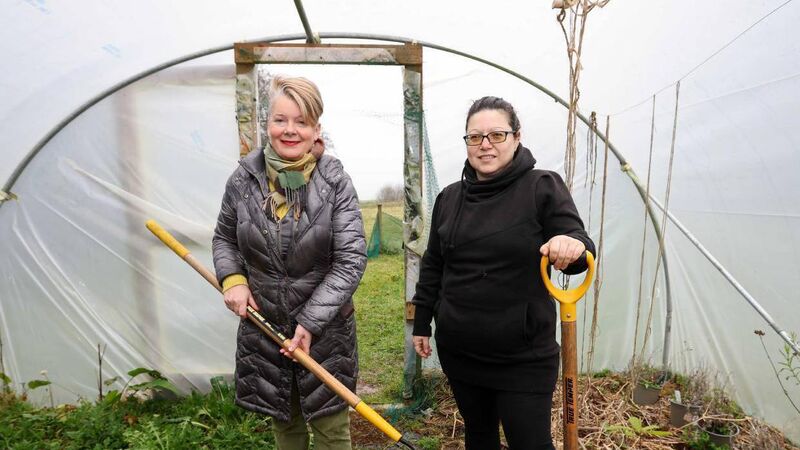A radical new approach to food needed, and Cork can lead way

You would think this would be a priority for a wealthy country with a booming economy. Yet Ireland continues to struggle to feed its children.
The Children’s Rights Alliance (CRA), in its 2025 Child Poverty Monitor, outlined how the number of children in consistent poverty had risen by a staggering 45,017 in 2024 to 102,977.
“This poverty is not inevitable,” stated the CRA. “Policy decisions and budget investments determine the fate of these children and young people.”
The Health Behaviour in School-Aged Children (HBSC) study reported recently that almost a quarter of children sometimes went to bed hungry in 2022, the latest year of the analysis.
These figures align with a similar study by Amárach Research for Barnardos, also conducted in 2022, which found 17% of Irish parents and a quarter of those not working outside the home were not able to provide their children with ‘a sufficiently nutritious diet, quality and quantity which you would ideally like’. A fifth of parents admitted to skipping or skimping on their own meals so they could adequately feed their children.
Food is a huge issue for families with barely enough to live on. The Hot School Meals scheme has helped, and a new pilot scheme to provide food in the school holidays is another bonus. But they are tinkering at the edges of the system rather than transforming it.
Our food system is killing us. Designed to produce cheap calories after World War II, it is now the cause of one in four adult deaths globally – more than 12 million a year that are due to poor diets. As always, it is the poorest and most marginalised who are most likely to be sicker and die sooner.
Senior fellow with the International Food Policy Research Institute, and author of Food Fight; From Plunder And Profit To People And Planet, Dr Stuart Gillespie writes that it is too late for tinkering at the margins of the system – a radical overhaul is needed.
Governments can use taxation and laws on marketing, labelling, advertising and ingredients to shift the food environment. They can provide social and economic safety nets for low income communities.
Yet the rate of progress in implementing these policy levers is excruciatingly slow because policy-makers do not feel they have the public mandate to introduce the steps needed.
In Ireland, 45.9% of household purchases come from ultra processed food, resulting in one of the unhealthiest food systems in Europe. Only the UK (50.7%) and Germany (46.2%) are higher, with countries at the lower end including Portugal (10.2%), Italy (13.4%), and Greece (13.7%), according to data published in Public Health Nutrition (2018). Yet we somehow accept this as normal.
A key policy action is for governments to disincentivise unhealthy foods while using subsidies and pricing to incentivise healthier food purchases for all, especially low income households and families.
The CFPC was formed a decade ago to work to achieve a fairer, healthier, more secure, and sustainable food system. With an emphasis on collaboration and cross sectoral working, it has been instrumental in delivering a range of community-based initiatives including community gardens, Cork sustainable food awards, and mapping of the food system in the city.
It is now in the process of co-creating and implementing a Sustainable and Healthy Food Strategy for the city.
The CFPC has received funding from FEAST, an EU-based project with the aim of ‘making it easy for every person in Europe to eat a delicious, healthier and more sustainable diet’. Joining FEAST allowed the CFPC to access EU funding and facilitated recruitment of its first Food Policy Development Officer, Sandrine Bertin, last October, to develop a food strategy and food hub for Cork.
A key development has been the launch of a Test Site market garden on an acre of agricultural land near Douglas, with the first team of four trained growers.
Aligned with this is an evaluation of the city hospitals’ needs for fresh local produce for their kitchens. The CFPC aspire to secure more land while working with Cork City Council to expand the activities of this first team of growers from the Test Site community market garden.
In Watergrasshill, an independent pilot initiative set up by a local dairy farmer, with the support of the Bioregional Weaving Network, uses half an acre of land to set up a community garden, with around 20 participating households, in a bid to see locals growing their own food on local land.
The initiative is using a Dutch template (Herenboeren) to engage with sustainable food production in a model where a farmer receives a salary from community members who support the production of local produce to feed their families.
The need for new ways of farming for a future where value is created for both nature and society, while also delivering financial, sustainable and predictable returns, is clear and long overdue.
Green Spaces for Health is a collaborative model developed with the CFPC and Cork Healthy Cities that includes the development of 24 community gardens across the breadth of the city. Togher community garden is in its fourth year on a sixth of an acre.
Now, Coordinator of Green Spaces for Health Maria Young, wants to take the community garden to the next level by acquiring an acre of land within Togher to harness the experience in the community garden and grow a range of food at a far greater capacity than is currently possible in the garden in Clashduv Park. They are keen to locate a site that can facilitate visits from schools, let children and adults learn to grow and maintain entire drills of a variety of vegetables.
These are just some of the exciting initiatives happening in Cork in an attempt to radically shift the food environment away from cheap ultra-processed and junk food to healthy food that is readily accessible and affordable.
All these initiatives could be supported by Government policy that includes: a requirement for a fraction of Hot School Meals to be provided by local producers; a tax on junk food that is directed towards supporting local fruit and vegetable producers; and subsidies that reduce the cost of fruit and vegetables in retail outlets. With sufficient political will, this is very achievable.
In the meantime, if you are in a position to offer Green Spaces for Health a half to an acre of land in the Togher area to develop local produce for local people, please get in touch with Maria Young at greenspacescork@gmail.com







 App?
App?




